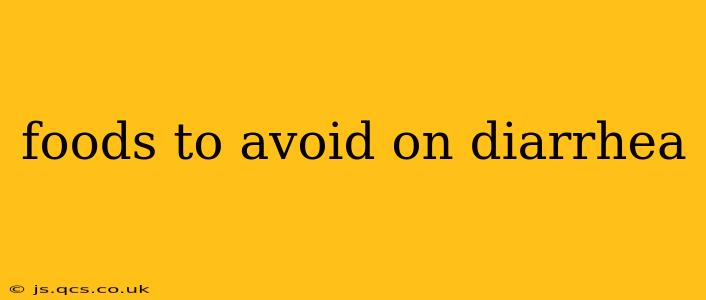Diarrhea, characterized by loose, watery stools, can be incredibly uncomfortable and debilitating. While it often resolves on its own, knowing which foods to avoid can significantly speed up your recovery and minimize discomfort. This guide details foods to steer clear of when battling diarrhea, along with explanations of why they're problematic and what to eat instead.
What Causes Diarrhea?
Before diving into the foods to avoid, it's helpful to understand the root causes of diarrhea. This isn't always a simple answer, as several factors can trigger it, including:
- Viral, bacterial, or parasitic infections: These are common culprits, often leading to acute diarrhea.
- Food poisoning: Contaminated food or drinks can cause sudden and severe diarrhea.
- Medication side effects: Certain medications can list diarrhea as a potential side effect.
- Lactose intolerance: Difficulty digesting lactose (milk sugar) can cause diarrhea.
- Irritable bowel syndrome (IBS): A chronic condition causing digestive issues including diarrhea.
- Inflammatory bowel disease (IBD): Conditions like Crohn's disease and ulcerative colitis can lead to chronic diarrhea.
Foods to Avoid with Diarrhea: The Troublemakers
Several food groups can exacerbate diarrhea symptoms due to their high sugar content, fat content, or difficulty in digestion. Let's explore these in detail:
1. High-Fat Foods
Why avoid them? Fatty foods are harder to digest, and they can stimulate bowel movements, potentially worsening diarrhea. The extra fat adds bulk and speed to the transit time in your intestines, further contributing to the problem.
Examples: Fried foods, greasy meats, processed meats like sausage, full-fat dairy products (except as noted below), and rich desserts.
2. Spicy Foods
Why avoid them? Spices irritate the already inflamed digestive tract, leading to increased bowel movements and discomfort. The capsaicin in chili peppers, for example, is a known irritant.
Examples: Chili, curry, hot sauce, pepper, and other spicy dishes.
3. High-Sugar Foods
Why avoid them? Sugary foods can worsen diarrhea by drawing water into the intestines, increasing the frequency and volume of bowel movements. This osmotic effect can also lead to dehydration.
Examples: Candy, sugary sodas, fruit juices (although some fruits are okay in moderation), and other sugary desserts.
4. Caffeinated Beverages
Why avoid them? Caffeine acts as a stimulant, which can increase bowel movements and worsen diarrhea. It also has a mild diuretic effect, contributing to dehydration.
Examples: Coffee, tea, soda (even non-sugar varieties), and energy drinks.
5. Alcohol
Why avoid them? Alcohol irritates the digestive tract and can dehydrate you, both exacerbating diarrhea symptoms. It can also interact negatively with certain medications you might be taking.
Examples: All alcoholic beverages, including beer, wine, and spirits.
6. Artificial Sweeteners
Why avoid them? Some artificial sweeteners like sorbitol and xylitol are known to have a laxative effect, potentially worsening diarrhea. Check food labels carefully.
Examples: Foods and drinks containing sorbitol and xylitol.
7. Raw Vegetables and Fruits
Why avoid them? While most fruits and vegetables are incredibly healthy, their high fiber content can be difficult to digest when your digestive system is already stressed. This can make diarrhea worse. However, ripe bananas are an exception, being recommended as they are easy to digest and provide potassium.
Examples: Cruciferous vegetables like broccoli, cauliflower, and cabbage; leafy greens; raw fruits (except bananas).
3. What to Eat When You Have Diarrhea?
Focusing on a bland, easily digestible diet is key. The BRAT diet (Bananas, Rice, Applesauce, Toast) is often recommended. Other good choices include:
- Plain rice: Easy to digest and provides carbohydrates for energy.
- Bananas: A good source of potassium, which can be lost through diarrhea.
- Plain toast: Provides carbohydrates without irritating the digestive tract.
- Boiled potatoes: Easy to digest and offer carbohydrates.
- Broth (clear): Helps rehydrate and replenish electrolytes.
- Crackers: Bland and simple for the digestive system.
- Yogurt (plain): Provides probiotics which can help restore gut flora.
Important Note: If your diarrhea persists for more than a few days or is accompanied by severe symptoms (fever, blood in stool, severe abdominal pain), seek medical attention immediately. This information is for general guidance and does not substitute professional medical advice.
Frequently Asked Questions (FAQ)
How long should I avoid these foods?
Until your diarrhea symptoms subside and your digestive system feels back to normal. This could be a few days or longer, depending on the cause and severity of your diarrhea.
Can I eat any dairy products at all?
Plain, low-fat yogurt with live and active cultures may be beneficial because of the probiotics, but avoid other dairy products until your diarrhea improves. Full-fat dairy should be avoided as mentioned earlier.
What about probiotics?
Some people find probiotics helpful in restoring gut health after diarrhea. Choose plain yogurt with live and active cultures or a probiotic supplement. However, it's best to discuss probiotics with your doctor before incorporating them into your diet, especially if you have underlying health conditions.
Are all fruits bad?
No, ripe bananas are generally well-tolerated due to their high potassium content and easy digestibility. Other fruits may be difficult to digest.
This guide provides helpful information, but remember that everyone's digestive system reacts differently. If you have specific concerns or questions, always consult your doctor or a registered dietitian for personalized dietary advice.
